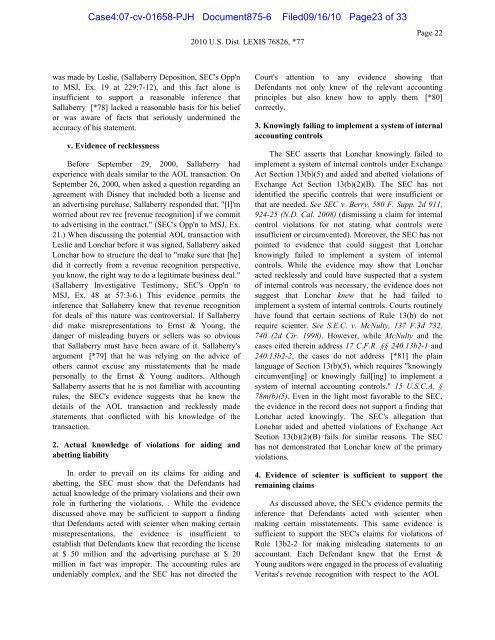exhibit 2 - SAP Lawsuit Portal
exhibit 2 - SAP Lawsuit Portal
exhibit 2 - SAP Lawsuit Portal
You also want an ePaper? Increase the reach of your titles
YUMPU automatically turns print PDFs into web optimized ePapers that Google loves.
Case4:07-cv-01658-PJH Document875-6 Filed09/16/10 Page23 of 33<br />
was made by Leslie, (Sallaberry Deposition, SEC's Opp'n<br />
to MSJ, Ex. 19 at 229:7-12), and this fact alone is<br />
insufficient to support a reasonable inference that<br />
Sallaberry [*78] lacked a reasonable basis for his belief<br />
or was aware of facts that seriously undermined the<br />
accuracy of his statement.<br />
v. Evidence of recklessness<br />
Before September 29, 2000, Sallaberry had<br />
experience with deals similar to the AOL transaction. On<br />
September 26, 2000, when asked a question regarding an<br />
agreement with Disney that included both a license and<br />
an advertising purchase, Sallaberry responded that, "[I]'m<br />
worried about rev rec [revenue recognition] if we commit<br />
to advertising in the contract." (SEC's Opp'n to MSJ, Ex.<br />
21.) When discussing the potential AOL transaction with<br />
Leslie and Lonchar before it was signed, Sallaberry asked<br />
Lonchar how to structure the deal to "make sure that [he]<br />
did it correctly from a revenue recognition perspective,<br />
you know, the right way to do a legitimate business deal."<br />
(Sallaberry Investigative Testimony, SEC's Opp'n to<br />
MSJ, Ex. 48 at 57:3-6.) This evidence permits the<br />
inference that Sallaberry knew that revenue recognition<br />
for deals of this nature was controversial. If Sallaberry<br />
did make misrepresentations to Ernst & Young, the<br />
danger of misleading buyers or sellers was so obvious<br />
that Sallaberry must have been aware of it. Sallaberry's<br />
argument [*79] that he was relying on the advice of<br />
others cannot excuse any misstatements that he made<br />
personally to the Ernst & Young auditors. Although<br />
Sallaberry asserts that he is not familiar with accounting<br />
rules, the SEC's evidence suggests that he knew the<br />
details of the AOL transaction and recklessly made<br />
statements that conflicted with his knowledge of the<br />
transaction.<br />
2. Actual knowledge of violations for aiding and<br />
abetting liability<br />
In order to prevail on its claims for aiding and<br />
abetting, the SEC must show that the Defendants had<br />
actual knowledge of the primary violations and their own<br />
role in furthering the violations. . While the evidence<br />
discussed above may be sufficient to support a finding<br />
that Defendants acted with scienter when making certain<br />
misrepresentations, the evidence is insufficient to<br />
establish that Defendants knew that recording the license<br />
at $ 50 million and the advertising purchase at $ 20<br />
million in fact was improper. The accounting rules are<br />
undeniably complex, and the SEC has not directed the<br />
2010 U.S. Dist. LEXIS 76826, *77<br />
Page 22<br />
Court's attention to any evidence showing that<br />
Defendants not only knew of the relevant accounting<br />
principles but also knew how to apply them [*80]<br />
correctly.<br />
3. Knowingly failing to implement a system of internal<br />
accounting controls<br />
The SEC asserts that Lonchar knowingly failed to<br />
implement a system of internal controls under Exchange<br />
Act Section 13(b)(5) and aided and abetted violations of<br />
Exchange Act Section 13(b)(2)(B). The SEC has not<br />
identified the specific controls that were insufficient or<br />
that are needed. See SEC v. Berry, 580 F. Supp. 2d 911,<br />
924-25 (N.D. Cal. 2008) (dismissing a claim for internal<br />
control violations for not stating what controls were<br />
insufficient or circumvented). Moreover, the SEC has not<br />
pointed to evidence that could suggest that Lonchar<br />
knowingly failed to implement a system of internal<br />
controls. While the evidence may show that Lonchar<br />
acted recklessly and could have suspected that a system<br />
of internal controls was necessary, the evidence does not<br />
suggest that Lonchar knew that he had failed to<br />
implement a system of internal controls. Courts routinely<br />
have found that certain sections of Rule 13(b) do not<br />
require scienter. See S.E.C. v. McNulty, 137 F.3d 732,<br />
740 (2d Cir. 1998). However, while McNulty and the<br />
cases cited therein address 17 C.F.R. §§ 240.13b2-1 and<br />
240.13b2-2, the cases do not address [*81] the plain<br />
language of Section 13(b)(5), which requires "knowingly<br />
circumvent[ing] or knowingly fail[ing] to implement a<br />
system of internal accounting controls." 15 U.S.C.A. §<br />
78m(b)(5). Even in the light most favorable to the SEC,<br />
the evidence in the record does not support a finding that<br />
Lonchar acted knowingly. The SEC's allegation that<br />
Lonchar aided and abetted violations of Exchange Act<br />
Section 13(b)(2)(B) fails for similar reasons. The SEC<br />
has not demonstrated that Lonchar knew of the primary<br />
violations.<br />
4. Evidence of scienter is sufficient to support the<br />
remaining claims<br />
As discussed above, the SEC's evidence permits the<br />
inference that Defendants acted with scienter when<br />
making certain misstatements. This same evidence is<br />
sufficient to support the SEC's claims for violations of<br />
Rule 13b2-2 for making misleading statements to an<br />
accountant. Each Defendant knew that the Ernst &<br />
Young auditors were engaged in the process of evaluating<br />
Veritas's revenue recognition with respect to the AOL


